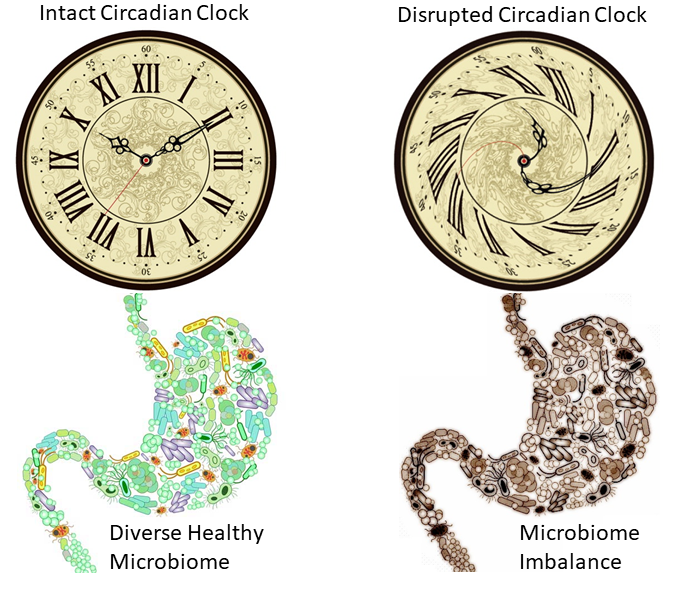
We have known for a while that the population of bacteria in our gut, our gut microbiome, affects the digestive, metabolic, and immune functions in our bodies, but science is showing that it also regulates our sleep and mental states through the microbiome-gut-brain axis. A scientific review study by Rijo-Ferreira and Takahashi published December 2019, discusses how our sleep and wake cycles, also called circadian rhythms, are affected by our genes, by our metabolism, by time-restricted feeding protocols, and by our microbiome.
An earlier review study by Li et al 2018, listed several gut bacteria that affect sleep. For example, some spore-forming bacteria, primarily from the Clostridium genus, modulate the amount of serotonin in the blood. Serotonin is known to promote REM sleep and low levels of serotonin are linked to the development of depression. In addition, Escherichia coli and Enterococcus, which are common in the intestinal tract, also produce small amounts of serotonin. The bacteria Lactobacillus and Bifidobacterium can secrete the neurotransmitter GABA, and abnormal expression of GABA mRNA is often observed in patients with depression and insomnia.
I recently wrote an article summarizing recent insomnia studies that show a genetic and emotional link between insomnia and depression. The studies looked at genes in the human genome, but studies of microbial genes have found the same correlation between insomnia and depression. Li et al 2018 found that the same bacteria which affect depression also affect sleep and are linked to insomnia. Among the gut bacteria with are increased in patients with depression are Bacteroidetes, Bacteroides multiforme, Proteobacteria, Actinobacteria, Enterococci, the Lachnospiraceae, and Ruminococcaceae. On the other hand, the abundance of Firmicutes, Bifidobacteria, Lactobacilli and other bacteria from the Lactobacillaceae family, and Faecalibacterium was significantly decreased in patients with depression. They cited other studies which found that compared with healthy people, patients with chronic fatigue syndrome had significantly reduced Escherichia coli and Bifidobacterium populations and significantly increased Enterococcus and Candida albicans populations.
Paulose et al 2016 demonstrated that at least one species of gut bacteria, Enterobacter aerogenes, is sensitive to the neurohormone melatonin, which is secreted into the gastrointestinal lumen, and expresses circadian patterns of swarming and motility. Melatonin specifically increases the magnitude of swarming in cultures of E. aerogenes, but not in Escherichia coli or Klebsiella pneumoniae.
To manipulate the gut microbiome for improving our health, probiotics are often used as dietary supplements. There is considerable evidence showing that probiotics may be effective in reducing stress and anxiety and alleviating low moods. However, specific probiotic strains that can be used for sleep improvement are rare. Most of the studies looking into that are from China and Japan on animal models. In October 2019, Lin et al. presented results on a probiotic that may improve sleep. The study investigated the effects of a psychobiotic strain, Lactobacillus fermentum PS150TM (PS150TM), on sleep improvement by using a mouse model. The oral administration of PS150TM, but not the other L. fermentum strains, helped mice fall asleep quicker and sleep longer. In other studies, supplementation of heat-killed Lactobacillus brevis SBC8803 was shown to modulate circadian rhythms; Japanese sake yeast was shown to promote non-rapid eye movement (NREM) sleep in mice; and in another study, the daily consumption of Lactobacillus casei Shirota or heat-inactivated Lactobacillus gasseri CP2305 improved stress-related symptoms and sleep quality in exploratory clinical trials. Li et al 2018 discussed other probiotics that can change the composition of the gut microbiota. For example, mice fed Lactobacillus rhamnosus showed reduced anxiety- and depression-related behavior.
The disruption of the circadian rhythm is associated with many diseases, including obesity, diabetes, cancer, cardiovascular disease, and susceptibility to infection. The data from all these studies shows that the human circadian system interacts with its microbiome through the synchronization or disruption of bacterial clocks. With advances in microbiome sequencing technologies, it may soon become clinical practice to profile the microbiome of people with sleep disorders. And while probiotics for sleep disturbances are only being researched now, one thing we can do now, is to research which foods increase the abundance of the beneficial sleep-inducing gut bacteria.
